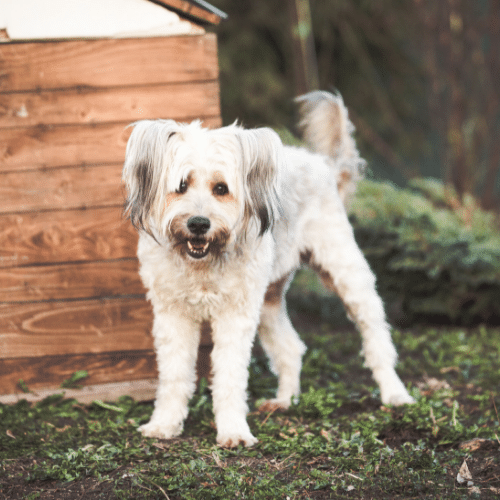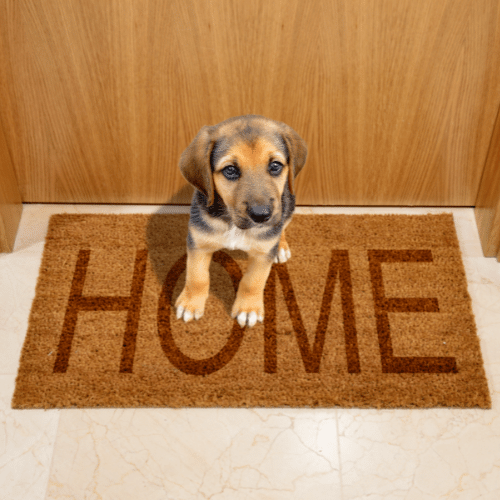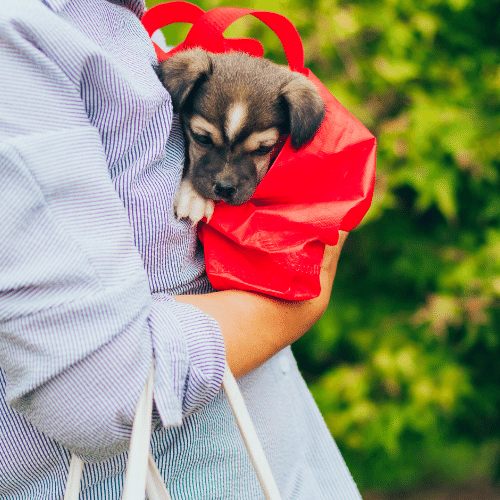Will My Rescue Dog Ever Be Normal?
December 30, 2021 2021-12-30 6:22Dogs do funny, silly, odd, and interesting things and we don’t always know the reasons behind their behavior. Even if you’ve had your dog from puppyhood, they can still surprise you with their actions.
When you adopt a dog, you’re getting a dog that has a history. Hopefully, this history is not traumatic. Sometimes, though, the dog you adopt can come from abusive and neglectful situations. Unless the rescue is told about the dog’s background, it’s impossible to know what they endured for the first part of their life.
If your rescued dog is acting in ways that puzzle you, you might be wondering if they will ever be normal. And is there anything you can do to help them get there?
Table of Contents

Why Is My Rescue Dog Acting This Way?
Dogs, like people, each have their own personalities. Some traits can be inherited through genetics. Others are the results of the dog’s environment.
If you don’t know much about your rescue dog’s history, there’s no way to tell exactly what they have been through. Dogs wind up in rescues for various reasons, and not all of them are pleasant.
Dogs that have been neglected for most of their lives are not going to have the same personalities or temperaments as dogs that have been nurtured and loved since they were puppies. At least, not right away. Adopting a rescue dog saves a life, but it also may mean the dog needs more time to adjust to a new way of living. After all, you can’t explain to them what’s happening.
If the neglect happened during the dog’s first weeks of life, this can cause lifelong neurological issues. Proper socialization must be done at the right time, or else it can be very hard for a dog to overcome their fear of new people and situations. While some dogs might love sitting next to you at an outdoor cafe, traumatized or severely abused dogs can view this as a torturous experience. Not every dog will react the same way to every experience.
If a dog has been abused, it’s only natural that they are mistrustful of humans, since humans were the source of his pain. The dog doesn’t know that some humans might not be abusive. They’ve learned that they have to be wary of people to try and protect themselves.
Even dogs that didn’t have a horrible past might find themselves terrified in rescue facilities. Some dogs are just more fearful by nature than others. If you bring a dog home who was well-loved and cared for before you adopted them, it doesn’t mean they won’t need time to adjust.

What Is Normal?
You may have visions of adopting a dog who loves to run errands with you, is pleasant with people and other animals, and is sociable and confident. That’s a lot to expect from any dog, let alone a rescue.
The best way to get a well-rounded, properly trained, and socialized dog is to have them from a puppy and start training classes as soon as the dog is vaccinated and can be around others. Even then, it’s important to remember that every dog is different and has their own likes and dislikes.
Before you adopt, consider if you’re willing to drop your expectations based on your specific dog’s needs. When you commit to a dog, you’re saying you will accept and love that dog exactly as they are and do what you can to help them be the best they can be. When you adopt a dog, you’re saying you will consider their past and allow them to adjust at their own pace. It’s important to not hold them to any preconceived notions of how they should act.
After all, you didn’t get the chance to help them flourish since they were a puppy. Now, you have a dog who doesn’t know how to react in their new environment and you’re all they have to rely on.
Normal for your dog will be their way of acting once they’ve adjusted and feel comfortable and safe with you. Then their true personality can finally shine.
Is Adopting a Rescue Dog a Bad Idea?
It is never a bad idea to save a life! If you have the room in your home and heart for a dog that didn’t have a great start in life, adopting is one of the most compassionate things you can do.
Many dogs find themselves homeless because they were part of an accidental litter and the puppies were given to a rescue. Others had happy lives, but the owners just couldn’t keep them any longer. In these cases, you could be adopting a properly trained and/or socialized dog who will adjust easily and behave well.
If the dog was rescued from a traumatic situation, the rescue workers will be able to tell you a little about their history. How they were found, what their home was like, and how they were living are all important to know to properly address their needs.
Bringing a rescue dog home means both of you are asking the other for trust. You want your dog to trust that you will take care of them, and you want to trust that the dog will acclimate and adjust well.
Remember that a dog in rescue is being assessed at intake in a place where they’re scared, nervous, anxious, and even angry. This is not the ideal situation in which to determine a dog’s true personality. In a shelter or rescue, a dog might seem fearful. Once you get that same dog home, they might show a completely different side.
Tips for Making Your Rescue Dog Feel Comfortable
Respect
By respecting your dog’s need for space and time, you’re showing them that they can trust you. The two go hand in hand. Trying to rush them before they are ready will make them think they have to be wary of you.
For example, petting them too much when they’re not used to human touch may make them more fearful. Less is more in these situations. Yours might be the first loving touch they have ever received. When they are comfortable with that feeling, they may start seeking out your affection.
Allow the dog to come to you when they feel ready. If they can approach you on their terms, they will feel more in control of the situation. When dogs feel comfortable enough to be close to you after they’ve been afraid of people for so long, it’s a deeply satisfying and rewarding feeling.
Space
Giving your dog a space that is all their own when they get to your home is important. They will be in survival mode, wondering what’s going to happen next. A safe space that they know is just for them will do a great deal to help them settle in and be comfortable.
This spot should be as quiet and cozy as you can make it. A soft bed or an open crate covered with a blanket can provide a secure environment where your dog can relax. Once they know nothing is going to hurt them in this space, they will feel more welcome and confident in their home.
Possessions
Offering your rescue dog their own things might be the first time in their life they’ve ever had them. Things like toys, treats, blankets, and beds might seem like the regular things you’d have for any dog, but for those who were abused or neglected, these are luxuries that they’ve never known.
Giving your dog things of their own will help them feel like your home is theirs, too.

Stick to a Routine
Dogs are most comfortable when they know what to expect. As creatures of habit, they thrive when they have a routine. Relying on this structure is calming to them. Knowing they will always be fed, be walked, play, and sleep at certain times will help them settle into their environments easier.
Relying on you to keep this routine will establish trust, too.
Stay Positive
Your dog can sense your energy. More than that, they look to you to see how to respond to things. You want your dog to associate their environment with positive feelings. By staying positive through things like loud noises, sirens, or the dreaded vacuum, you will show your dog that there isn’t anything to be scared of. Keep treats available to reward the dog for being calm.
Eventually, they can learn that they’re safe no matter what and that things that used to scare them now mean treats, love, and comfort.
How Long Will This All Take?
This is up to the dog. However, by doing everything you can to help the dog feel comfortable and relaxed, you can shave some time off of this process. The length of time it takes will be determined by your dog’s personality.
Typically, it takes, on average, three months for your dog to settle in and start to show their true personality. Keep in mind the shelter is an overwhelming place. A dog that is normally happy and outgoing can turn fearful and aggressive in that environment. Some will completely shut down as a way to protect themselves, even refusing to eat.
Your dog can only be themselves when they are sure it’s safe. That length of time varies for each dog. Patience and consistency are the keys to helping them adjust and feel safe in their home.
Even if you do everything right, some dogs will never overcome their traumatic and abusive pasts. They will always be skittish and fearful, no matter what. This does not mean they won’t be wonderful companions.
Your fearful dog can learn to love and trust you, even if they don’t ever learn to trust anyone else. The bond you form with them is for you and your family. The dog may love you, but also be wary of strangers and new places.
It’s your job to show them that you love and accept them. As long as they are free to be themselves with you, that bond will grow. What matters is the dog has a good life in their home with the people who love them.

Don’t Punish
Avoid punishing your dog for anything. This is a new experience for them and they’re unsure of what to do. Show them what you want them to do instead.
Reward them for doing the desired action. Your dog is more likely to repeat that behavior because they want your praise and affection – and possibly a delicious treat. Introduce the behaviors you want to see. For example, if you don’t want your dog on a certain piece of furniture, reward them when they leave that spot and move to an acceptable one.
Punishing your dog can have a negative effect on any progress you’ve made. If your dog now starts to fear you, on top of the fear they’re already feeling, your chances for a successful relationship can be damaged beyond repair.
Your dog didn’t ask for any of this. If you choose to bring them into your home, you have to provide the patience and love they need to thrive.
Even if you feel like no progress is being made, it still is. If you consistently keep up your daily routine, your dog will adjust.
Your dog also may not understand that this is their forever home, and they’re just waiting to be shipped off again. Let them have the time they need to process everything and learn to trust you.
Training and Socialization
Working with a trainer or taking your dog to socialization classes can start as soon as you think your dog has adjusted to their new life. It can also strengthen the bond you have with your dog. Teaching them things and rewarding them for doing these things will reinforce the trust your dog has in you.
If you feel your dog needs these things, then seek them out. However, don’t force your dog if they’re not ready. Classes may overwhelm them. You can then instead work with a trainer one-on-one or through online courses. Dog parks may terrify them. But they may enjoy walks with you and friends that have dogs, too.
What You Can Expect When You Bring Your Rescue Dog Home
- Not wanting to be touched
- Hiding behind or under furniture
- Being easily scared
- Chasing other animals in the home
- Refusing to move, walk on a leash, or eat
- Barking
These behaviors are normal for the first week or so. Over time, your dog can learn different ways of coping and feeling safe. Even the most “normal” dogs can still hide in closets and under the bed during a thunderstorm. Remember that animals don’t understand things the way people do.
Forcing the dog to try to relate to a human way of operating is going to leave you frustrated. It’s easier for everyone if humans adjust to the way the dog operates. And a scared dog will operate in ways that may not make sense to you, but they make sense to them. You know thunder is not going to hurt you. The dog thinks the house is under attack.
Rescuing a puppy
Every dog in rescues could potentially come from situations that were harmful to them. The likelihood of this decreases the younger the dog is. Adopting a puppy means they did not have as much time as an older dog to be mistreated, so you can raise the puppy however you see fit.
The earlier you can start obedience training and socialization with your pup, the easier things will be.
Adopting an older dog means you take a chance on their unknown history and accept whatever behavior issues they have.
Either way, saving a rescue dog’s life is rewarding. It also makes room for another dog to come into the rescue and be saved, taking your adopted dog’s place.

How Can I Tell If My Dog Is Trusting Me?
If you wonder if you’re making progress with your dog acting more “normal,” watch for signs that are different now than from when you first brought your dog home. If your dog is scared by something, do they turn to you for eye contact and reassurance?
Dogs that are feeling comfortable with you will seek out your affection. They will be more willing to go through a training session with you and follow your commands. They will sleep near you. When you approach, they’ll be comfortable and relaxed. They’ll bring you toys to play with and want to be around you.
If you’re noticing these behaviors from your dog when they were reluctant to do them before, then you’re doing something right.
The bottom line
Your rescue dog will be normal according to their version of normal. Sometimes, it means a fully-adjusted dog with a wonderful temperament and love of new adventures. Other times, it means your dog is still unsure of the world around them, but as long as they have you to trust, they’re okay.
Every dog can have a bond and good relationship with their owner. It just takes time, patience, and a routine that doesn’t vary. Remember that even though some parts of the adjustment phase will be hard, the reward will be worth it.

Author: Jessica Rossetti
Jessica lives in Chicago with her husband, Dominic, and their rescued cat, Toast. She has lived with dogs for over 30 years and spends her days writing, caring for various animals, and enjoying her backyard that has become an oasis for wild creatures.
Her passion for animals began at a young age when she would bring home the lost dog or cat. As she got older, she went on to bring home an injured bird or raccoon. This love and desire to help all creatures led to her work as an adult with various animal rescues, where she saved the lives of many domestic and wild animals while learning the necessary skills to care for them.
Owning and operating a professional pet care service in Chicago for the past twelve years, Jessica cares for dogs in her home while writing full-time.

